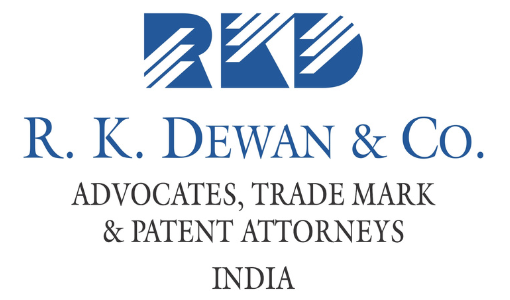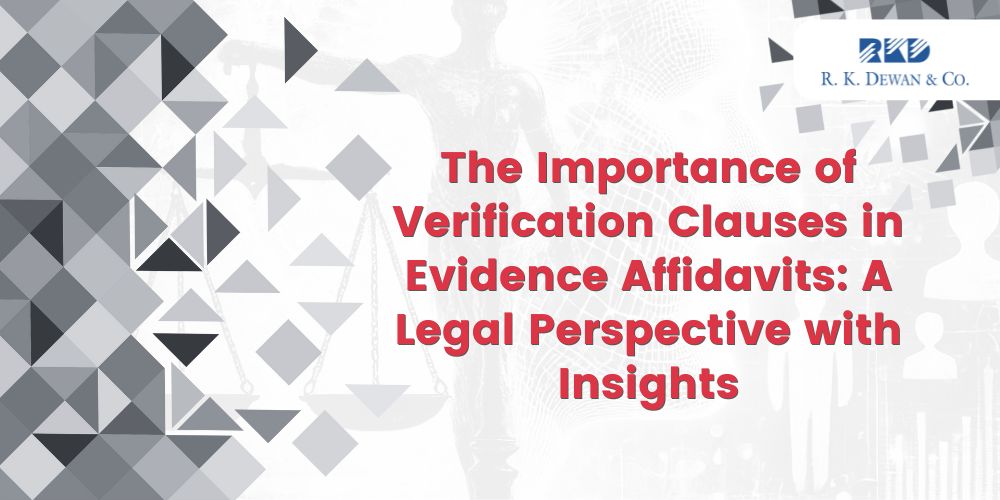Verification clauses in pleadings and evidence affidavits are not only critical components in court proceedings but are equally necessary during hearings and proceedings before various Intellectual Property (IP) registries, such as the Trademark Registry, Copyright Registry, Patent Office, Designs Registry and the Geographical Indications Registry. Serving as a crucial tool for maintaining the credibility of information placed on record, verification clauses ensure that statements made are not only accurate but are grounded in personal knowledge or substantiated by proper records. Under the provisions of the Code of Civil Procedure (CPC) and the Commercial Courts Act, 2015, which provide stringent guidelines to ensure that the evidence submitted to Courts as well asadjudicating authorities is credible, accurate, and reflective of the deponent’s personal knowledge or legally substantiated information, the role of verification goes beyond mere formality, acting as a safeguard against false or misleading claims. This article explores the legal framework governing verification clauses, their essential function in legal proceedings, and the consequences of non-compliance, shedding light on how both individuals and corporate entities can uphold the integrity of their case through adherence to these legal mandates.
Legal Framework Governing Verification Clauses
Order VI of the CPC deals with pleadings, while Order XIX governs the use of affidavits in evidence. Both require that the deponent clearly state, in the verification clause, which portions of the affidavit are based on personal knowledge and which are derived from information or belief. Specifically, under Order XIX Rule 3(1), affidavits must be confined to facts within the deponent’s personal knowledge, unless they are interlocutory applications where statements of belief may be admitted, provided the source of such belief is disclosed.
It means the deponent is required to mention, in verification that which part of his evidence affidavit is, based on information and which part is based on belief. So also, he is required to divulge the source of his information, as well of his belief. Whether the matter deposed is not based, on personal knowledge but on information the source of such information should be clearly disclosed.
Order VI Rule 15(A) sub clause 2 states that, an affidavit shall be signed by the party or by one of the parties to the proceedings, or by any other person on behalf of such party or parties who is proved to the satisfaction of the Court to be acquainted with the facts of the case and who is duly authorised by such party or parties. This is in line with the principle that a person may only provide evidence on matters within their personal knowledge.
Order XI, Rule 5 of the Supreme Court Rules contains provision similar to Order 19 Rule 3 (1) of CPC, which has been explained in the case of Smt. Savitramma v. CicilNaronha and anr, AIR 1988 SCC 1987. The Court held, in para 2 at page 1988, as follows: “…In the case of statements based on information the deponent shall disclose the source of his information… Affidavit is a mode of placing evidence before the Court. A party may prove a fact or facts by means of affidavit before this Court but such affidavit should be in accordance with Order XI, Rules 5 and 13 of the Supreme Court Rules…”
The purpose underlying this provision is to enable an adjudicating authority to determine as to whether it would be safe to act on such evidence and to enable the Court to know as to what facts are based in the affidavit on the basis of personal knowledge, information and belief as this helps distinguish between first-hand information and secondary data, thereby ensuring transparency and credibility and is relevant for the purpose of appreciating the evidence placed before the Court, in the form of affidavit.
Under the Trade Marks Act, 1999, the requirement of a verification clause is integral to the submission of affidavits and other pleadings. Section 145 of the Act mandates that affidavits used in proceedings before the Registrar of Trademarks must be properly verified, ensuring the accuracy and credibility of the statements made. Section 127 of the Act, which governs the filing of affidavits in trademark proceedings, mandates that affidavits must be verified to confirm that the statements made are either based on personal knowledge or derived from credible sources such as company records.
Additionally, Rule 121 of the Trade Marks Rules, 2017 emphasizes the need for a statement of truth affidavit, where the deponent attests that the contents of the affidavit are true to their knowledge and belief, making them accountable for any falsehood or misrepresentation.
“Statement of Truth”
There is a variation in respect of leading evidence under the Commercial Courts Act, 2015, particularly pertaining to IP matters. The Commercial Courts Act, 2015 introduced several amendments to the Civil Procedure Code (CPC), 1908 concerning commercial disputes, including provisions related to the verification of pleadings for which Order VI Rule 15A CPC was added.Order VI Rule 15A of CPC mandates the verification of pleadings by way of a Statement of Truth in place of an affidavit.
For artificial entities like companies, it is common for an authorized representative to verify pleadings and affidavits based on corporate records, since these entities cannot have personal knowledge of facts themselves. In such cases, representatives are expected to verify the information based on records and documents that are contemporaneously maintained by the company, ensuring that the evidence is both reliable and admissible. Pleadings and evidence affidavits must be verified in accordance with the provisions of the Code of Civil Procedure (CPC) and the Commercial Courts Act, 2015 as amended. Pleadings and affidavits which are not in compliance with the abovementioned mandate, can be amended by obtaining the leave of the Hon’ble Court in which case the technical lacunas or deficiencies can be overcome by the parties.
There are several judicial precedents wherein Courts have permitted amendments even up to the stage when the matter is reserved for judgment.
Failure to comply with the verification requirement can have legal consequences, as the Court may reject the pleading or require the party to rectify the defect. This underscores the importance of strict compliance with the verification mandate.
Legal Challenges to Verification
The importance of following proper verification procedures when submitting evidence affidavits in Court was an important aspect which was considered by the Pune District Court in the recent case of Burger King Corporation V. Proprietors of a Pune Eatery with the brand name ‘Burger King’ (Anahita and ShapoorIrani) and shed light on the importance of adhering to these requirements.
In Burger Kingcase, the defendants argued that merely mentioning in verification of Burger King’s evidence affidavit, that the contents of evidence affidavit are true, and correct to the best of his or her knowledge and on based, information of plaintiff was not proper and legal verification of evidence affidavit, was not in accordance with Order, 19 Rule 3 (1) of the Civil Procedure Code. Hence, due to non-verification of the evidence affidavit in proper form, it could be admitted in evidence nor could it be, treated as evidence of the deponent concerned.They relied on precedents like Miraj Marketing Corporation v. Vishaka Engineering &Anr and AKK Nambiar v. Union of India (UOI), which underscore the importance of clearly distinguishing between facts based on personal knowledge and those based on belief or information.
In the Miraj Marketing Corporation case, the Delhi High Court, following the observations of the Hon’ble Supreme Courtof India in AKK Nambiarcase, emphasized that an affidavit lacking proper verification could not be admitted as evidence. This principle was echoed in the Burger King case, where the Pune District Court scrutinized the verification clause of Burger King’s witness.
Burger King Corporation countered stating that their affidavit complied with the legal requirements, relying on the decision in Central Bank of India v. Tarseema Compress Wood Manufacturing Company. In that case, the Court held that anyone acquainted with the facts of the case could give evidence, even if they were not personally involved in the events being discussed. Burger King Corporation contended that the deponent’s affidavit was based on records and documents supporting the facts pleaded in the plaint, thereby fulfilling the verification requirements.
Observations and Ruling
The Court meticulously analyzed the verification clause of the affidavit submitted by Burger King Corporation’s witness. It noted that the affidavit merely stated, “Whatever above written is true and correct to the best of my knowledge, information and belief.” The Court held that this generalized verification failed to meet the requirements of Order XIX Rule 3(1), which mandates that the deponent specify which parts of the affidavit are based on personal knowledge, which are based on information, and which are based on belief.
Moreover, the Court pointed out that the witness had no personal knowledge of the events or facts detailed in the affidavit. The witness was neither an employee of Burger King Corporation nor of its Indian subsidiary at the time of the events described in the suit. The Court observed that the witness’s entire testimony was hearsay, and as such, the affidavit could not be considered admissible evidence. The Court ruled:
“It is apparent that the witness has no personal knowledge about any events, facts, cause of action, or averments made in the evidence affidavit of examination-in-chief. His entire evidence is of hearsay nature and further, as per legal requirement, he ought to have disclosed the source of his information which he referred/deposed in affidavit. Therefore, whatever mentioned in the evidence affidavit of PW-1 could not be proved and, therefore, the evidence affidavit of PW-1 is required to be treated as no evidence.”As a result, the Court observed that Burger King Corporation failed to provide cogent evidence to support its claims.
Implications for Future Litigation
Failure to comply with the mandates of Order XIX Rule 3(1) can result in affidavits being excluded from evidence, as seen in this case. While Courts may allow amendments to rectify defective verification, as demonstrated in previous judgments, it is essential for parties to ensure that affidavits are verified correctly from the outset to avoid jeopardizing their case.
Verification clauses serve as an essential safeguard to maintain the integrity of the judicial process. By clearly delineating which portions of an affidavit are based on personal knowledge and which are based on information or belief, the Courts are better equipped to assess the credibility of the evidence. Incorporating these principles into everyday legal practice ensures that evidence affidavits remain a reliable tool for upholding justice, particularly in commercial litigation where accuracy and legal precision are paramount.


